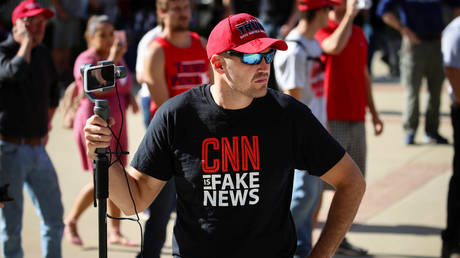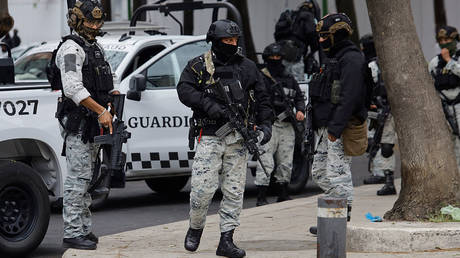
With a new year comes a new strain of coronavirus and a new wave of fear-porn news stories. But as 2020 proved, you can’t trust everything the media tells you about Covid-19.
A year since it first spread beyond China and engulfed the world, Covid-19 hasn’t abated. Some 88 million people worldwide have caught the deadly illness, and nearly two million have perished. With a new and more infectious strain on the rise, governments have implemented draconian restrictions on liberties and urged their populations to get vaccinated, with further deprivations of freedoms on the horizon for those who refuse.
Ahead of an uncertain year, in which a return to normality looks ever more distant, the mainstream media is standing by to bring you the most graphic and terrifying stories of the virus’ impact – like the New York Times did last week in a photo feature chronicling the “wave after wave” of the virus that hit Europe, or two weeks earlier when it described the “unseen and incalculable” scars of survivors.
But these stories won’t always be trustworthy. The media proved this on numerous occasions during 2020, often peddling fake news to earn clicks or push their narrative.
An ever-shifting narrative
The mainstream media went to great lengths in 2020 to warn the public of dangerous “misinformation” about Covid-19, in particular anything that smacks of anti-vaxx sentiment. Yet the “trustworthy” information broadcast by the media changed by the day. First, Americans were told to “get a grippe,” and remember that “the flu is a much bigger threat than coronavirus.” They were told that “people in the United States shouldn’t panic.” However, they were soon told the exact opposite, as articles advising them “how to sleep with coronavirus anxiety” and how to weather the “mental and emotional fallout of living and working through a pandemic” soon replaced these soothing stories.
Of course, nobody can issue authoritative declarations at the beginning of a new and unknown pandemic, and our collective understanding of the coronavirus changed repeatedly last year as new facts came to light. Still, some media outlets seemingly preferred to pretend they were right from the beginning. Vox, for example, told its readers in March that they could “pass on” face masks, calling them “only useful if you have a respiratory infection already.”
When mask-wearing became gospel, Vox deleted its tweet. However, it wasn’t the first time the liberal news site u-turned on its own statements. Shortly before tweeting about masks in March, Vox deleted a tweet from January in which it confidently declared: “Is this going to be a deadly pandemic? No.”
Dabbling in sensationalist scaremongering, or was it an ‘editing mistake’?
When the new coronavirus hit American shores, New York was the first city to see mass hospitalizations. Back in March, CBS News ran video footage showing an overcrowded hospital ward in the city, featuring nurses in protective gear scrambling to tend to bedridden patients.
In reality, the footage was shot in a hospital in Bergamo, Italy, by Sky News several days earlier. Once found out, CBS blamed its inclusion on an “editing mistake” and removed it from all of its shows.
CBS wasn’t the only news outlet caught recycling footage during the pandemic. Just last month, viewers caught a local news station in Los Angeles using scenes from a Brooklyn hospital in March to portray LA’s hospitals “at their breaking point.”
Lying nurse gives MSM another tear-jerking moment
Stories of human tragedy abound during the Covid-19 pandemic, but in their hunger for tear-jerking moments, some mainstream media outlets broadcast some straight-up fake news.
A clip originally broadcast by CBS in April showed nurse Imaris Vera bursting into tears and describing how she quit her job after “none of the nurses” in a dedicated coronavirus unit were wearing masks. Furthermore, she called out her Chicago hospital for banning nurses from using their own protective equipment in the facility.
“America is not prepared,” she sobbed, “and nurses are not being protected.”
Vera’s acting fooled CBS – and Vermont Senator Bernie Sanders – until it emerged that she had actually been given an N95 mask to wear, and that she quit on her first day back on the job, after taking a year out to build a career as an Instagram model and promote her own brand of boutique scrubs.
The video, complete with captions and dramatic music, is still available on CBS’ Twitter page.
Media moralizers break their own rules
Whatever public health diktats our governments issue and our journalists promote this year, expect them to disregard these rules the moment the cameras switch off.
Sky News’ Kay Burley spent months hammering UK politicians like Dominic Cummings for breaking their own lockdown rules, only to be caught dining out last month with nearly a dozen colleagues to celebrate her birthday.
She wasn’t the only media moralizer to fall on her own sword. Piers Morgan advocated for closing pubs and canceling Christmas, and branded those who disobeyed the British government’s draconian lockdown “Covidiots.” That is, until his son fancied marching in London with ‘Black Lives Matter’ protesters in July.
Across the Atlantic, journalists savaged President Donald Trump for forgoing his face mask, until the cameras stopped rolling. In just one day in May, CNN’s Kaitlin Collins grilled Trump for not wearing a mask, before slipping hers off following a subsequent White House press briefing, once Press Secretary Kayleigh McEnany walked off the podium.
Scary Sputnik and the Reckless Russians
Russia’s Sputnik V was the world’s first registered Covid-19 vaccine, and its arrival on the scene drove much of the western media hopping mad. They sounded the alarm over its hasty approval, called it a “propaganda instrument,” and declared that taking “Putin’s vaccine” would be akin to playing “Russian roulette” with one’s life.
As it turned out, Sputnik V passed its Stage-3 clinical trials with flying colors, and was deployed to the Russian public in early December. More than 50 countries signed up to purchase doses of the vaccine, and British-Swedish drugmaker AstraZeneca signed an agreement late last month to research the possible benefits of combining shots of its own vaccine with Sputnik V into a single immunization regimen.
Meanwhile, authorities in the US and UK had no problem issuing similar emergency authorizations to US drug firm Pfizer, while the media celebrated the first shots of the company’s vaccine being administered. Funny how vaccine skepticism only works one way.
Think your friends would be interested? Share this story!




